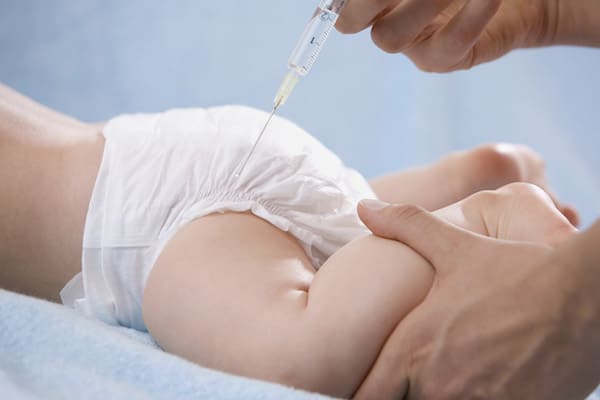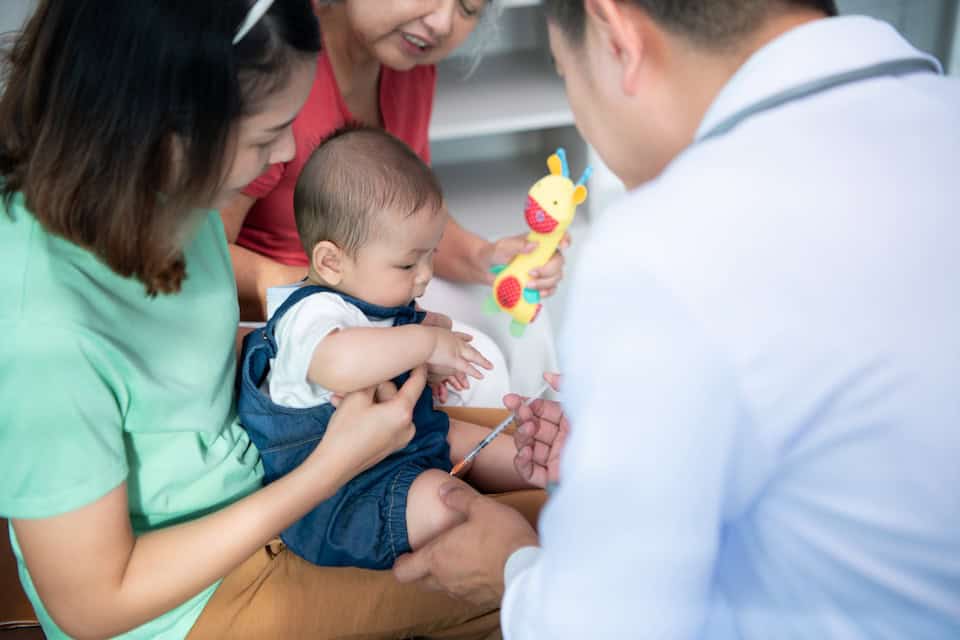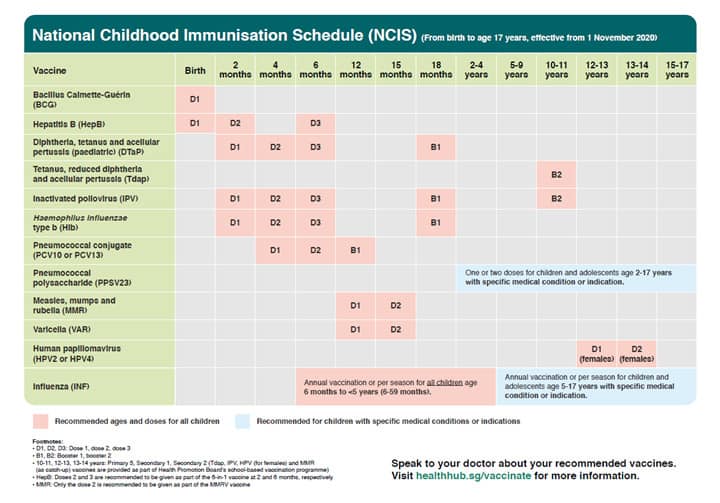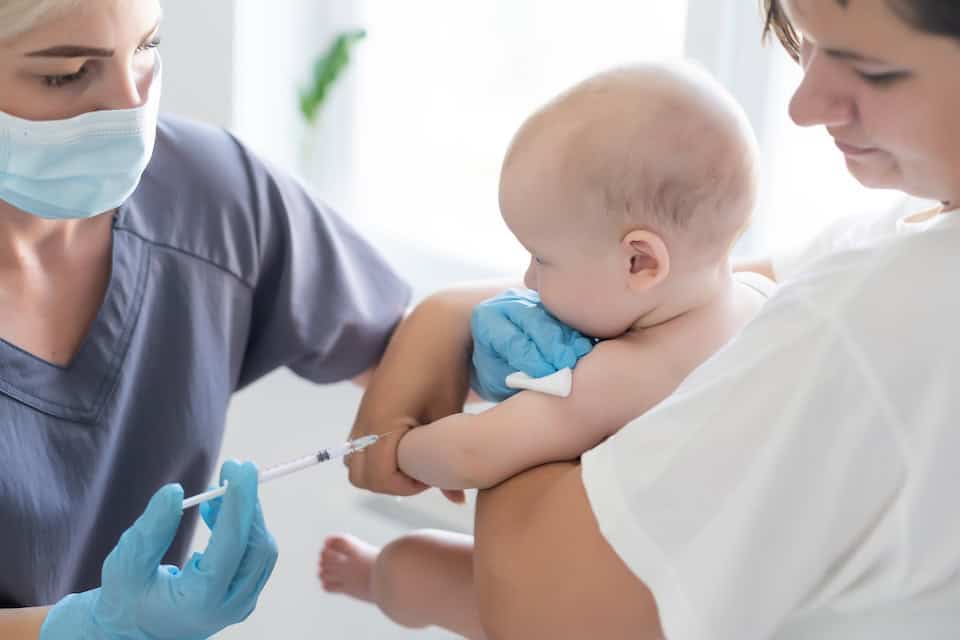
As parents, we’ve all heard about the importance of immunising our children against certain illnesses. Your child’s doctor would have also discussed why your little one should be vaccinated. In addition to vaccinations, ensuring your child’s safety in the car by choosing an appropriate child car seat that meets Singapore’s safety standards is equally important. In Singapore, vaccination policies are guided by national recommendations and government regulations, making certain vaccinations recommended and, in some cases, mandatory.
Almost all health professionals recommend immunising children, especially against common childhood diseases like chickenpox, mumps or rubella, because getting any of these diseases could ill your little one.
Organisations such as the Health Promotion Board (HPB) Singapore and the World Health Organization (WHO) strongly recommend childhood immunisations for several important reasons. Primarily, these vaccinations help protect your child from serious illnesses that can lead to severe complications by boosting their developing immune system. Vaccines work by stimulating the immune system to produce antibodies, providing immunity against diseases. Immunisation is a critical part of a child’s life, helping to protect them during key developmental stages.

Children Vaccination
Immunising your child through child vaccinations can help protect other children, too, especially if they are not immunised themselves for whatever reason. Also, if enough kids are vaccinated against a specific disease, the chances are that the condition may be eradicated. In Singapore, some immunisations are mandatory for all children under the Infectious Diseases Act, while others are optional.
The vaccinations currently required (guideline by MOH) for children in Singapore are part of the National Childhood Immunisation Schedule (NCIS) and include nationally recommended vaccinations listed by the Ministry of Health:
- BCG
- Hepatitis B
- Diphtheria
- Tetanus
- Pertussis (DTP)
- Poliomyelitis (Oral Polio Vaccine)
- Measles, Mumps, and Rubella (MMR)
- Chicken Pox
Combination vaccines, such as the 5-in-1 and 6-in-1, are beneficial as they reduce the number of injections a child receives by combining protections against several diseases into a single shot. These formulations combine vaccines to simplify the vaccination process and reduce the number of injections required.
Diphtheria and measles vaccinations are compulsory by law under the Infectious Diseases Act and are fully subsidised for Singapore citizens at local polyclinics. Only certain vaccine brands are eligible for these subsidies.
Optional vaccines (Chickenpox, Influenza, Rotavirus, Hepatitis A, Meningococcal and Pneumococcal) are available with your child’s paediatrician. Haemophilus influenzae type b (Hib) is included in combination vaccines, providing protection against multiple diseases with fewer injections.
The NCIS covers vaccinations for a range of vaccine-preventable diseases, and subsidised vaccine brands are available at CHAS GP clinics and polyclinics. Eligible Singapore citizens benefit from fully subsidised, nationally recommended vaccinations at these approved healthcare providers.
Keeping track of the childhood immunisation schedule can seem like a lot. We will discuss those immunisations in this article so you understand what to expect with and without certain immunisations.

A little child taking an injection from the doctor
Required Immunisations for Newborns: Childhood Immunisation Schedule
Health care has come a long way in taking preventative measures to ensure children receive the 1st dose of vaccinations, building the critical immune system to fight against deadly diseases. However, it is important to remember that only the dose is not enough; completing the entire vaccination series as recommended is essential for full protection.
BCG (Bacillus Calmette-Guerin)
Your baby will be given a weakened version of the BCG virus at birth. This jab protects your baby from tuberculosis (TB). Tuberculosis is a bacterial infection that affects the lungs, intestines, bones, kidneys, and brain. Untreated, it can cause severe spinal pain and stiffness. Long-term, tuberculosis leaves permanent damage to the lungs.
Hepatitis B Vaccine
The hepatitis B vaccine is given to your little one in 3 doses: the 1st will be at birth, the 2nd dose in the first month and the 3rd in the 6th month. Hepatitis B may not show signs until adulthood, such as liver cancer or chronic liver failure. It is crucial to follow your child’s immunisation schedule to ensure they receive all necessary doses on time.
Diphtheria/Pertussis/Tetanus (DPT) Vaccine
Your baby will be given three doses of the DPT vaccine from months 3-5. This 3-in-1 baby immunisation protects your child against Diphtheria, Whooping cough (Pertussis), and Tetanus. The vaccine contains acellular pertussis, a safer and more effective formulation used in routine immunisation to prevent pertussis infections in children.The vaccine contains acellular pertussis, a safer and effective formulation used in routine immunisation to prevent pertussis infections in children. Reduced diphtheria formulations are also available for older children or adults as part of the immunisation schedule.
- Diphtheria is a severe disease that can cause breathing problems, paralysis or heart failure.
- Pertussis causes coughing spells, making eating, drinking, or breathing difficult.
- Tetanus, also called lockjaw, is caused by bacteria commonly found in soil. When this germ gets into an open cut or wound, an unprotected person can get tetanus, creating severe muscle spasms that can be strong enough to snap the spine.
Poliomyelitis (Polio) Vaccine
Poliomyelitis, commonly known as polio, is caused by the poliovirus and primarily affects young children. The virus resides in the throat and intestinal tract and spreads through contact with the feces of an infected person, often via contaminated food or water.
When infected, children can become paralysed. While Singapore was declared polio-free in 2000, polio is still present in some countries, so the risk of getting this disease is still there, so it’s important to give it to your little one.
The first three doses are given when your baby is three months old, four months old and five months old. Boosters are given at 18 months, 6 and 11 years.
Measles, Mumps and Rubella Vaccine (MMR)
The MMR vaccine is given to your baby at 12 months old, with a booster at age 12. Catch-up doses are available for children or adolescents who missed their scheduled MMR vaccinations to ensure complete protection. The MMRV vaccine is a combined vaccine that also protects against varicella (chickenpox) and can be used for the second dose, offering broader protection in children and adolescents. With this vaccination for newborns, they are also protected from German Measles, one of the more severe variants. Achieving high vaccination rates is crucial for herd immunity, which protects both individuals and the wider community by reducing the overall spread of infectious diseases and minimizing the risk of outbreaks.
Measles: A virus that leads to chest infections and severe ear infections. The results of such can lead to permanent loss of hearing, premature brain damage, and seizures.
Rubella: Has mild symptoms for adults but can cause serious effects such as miscarriage and congenital symptoms if it appears during the early stages of pregnancy. Children exposed to rubella in utero may also see congenital disabilities.
Mumps: Also caused by a virus that causes painful swelling of the salvatory glands and high fever. Children with mumps also experience compilations such as deafness, painful swelling of the testicles, meningitis, encephalitis and sometimes death.
Chicken Pox (Varicella Vaccination)
Varicella vaccination is an optional childhood vaccination that protects against chickenpox. Air droplets and direct contact with fluids from blisters spread it. Chickenpox is contagious 1 to 2 days before the rash appears and until they are totally dry at around 5 to 7 days.
Usually, it is a mild irritant wherein the blisters are extremely itchy. More serious cases lead to permanent skin damage (scarring, pneumonia, shingles, and encephalitis)

National Childhood Immunisation Schedule, Singapore (credit: HealthHub.sg)
Why are Immunisations important for your baby?
Immunisations protect your baby against vaccine-preventable diseases that can cause serious complications or even death by strengthening their immune system. To maintain effective immunity, some vaccines require additional doses, known as booster doses, to be administered later (for example, diphtheria and tetanus).These additional doses are called booster doses. It is important to follow the schedule for all recommended vaccines as outlined by health authorities to ensure your child receives full protection. Annual vaccination, such as the influenza vaccine, is also recommended to maintain protection against seasonal outbreaks and ensure ongoing immunity throughout the flu season.
Immunisations are generally safe for most babies. However, live vaccines such as MMR (measles, mumps, and rubella) and oral polio should be avoided if your baby has a weakened immune system due to illness or medical treatment. If you have any concerns about your baby’s immunisations, please consult your doctor for personalised advice.
What are some side effects of vaccinations?
Vaccines are generally safe as they undergo extensive testing over many years to ensure their safety and effectiveness before receiving approval and licensing.
The risk of serious complications from vaccines is significantly lower than the risk of complications if your child contracts one of the diseases. Allergic reactions to vaccines are rare.
Common side effects of vaccines against Diphtheria, Tetanus, Pertussis, Polio, and Haemophilus influenzae type b (Hib) include redness and swelling at the injection site, a sore arm, or a slight fever. These mild reactions typically resolve within a few days. Your child may experience a fever on the day of vaccination and the following day.
The MMR vaccine can cause mild reactions occurring from a few days up to three weeks post-vaccination. Symptoms may include a mild cough, runny nose, skin rash, fever, or swollen salivary glands. Fever may arise between the 5th and 10th day after the injection. Importantly, your child will not be contagious during this time. Extensive studies have found no link between the MMR vaccine and autism.
For the Pneumococcal vaccine, the most common side effects are redness and swelling at the injection site, fever, tiredness, and sometimes a sore arm or mild fever.
Following the BCG vaccination, a small boil may develop at the injection site within 2-3 weeks. This typically resolves within 6-8 weeks. If the boil bursts, covering it with a piece of gauze is recommended.
If your child has had a previous serious reaction to a vaccine, or has certain medical conditions, certain vaccines may not be recommended. In these cases, you should seek further advice from your doctor.

Doctor makes a vaccination on a calm baby
Why is it so critical to keep up to date with immunisations?
Parents want to do everything possible to ensure their children are healthy and protected from preventable diseases. Vaccination is the best way to do that. Vaccination protects children from serious illness and complications of vaccine-preventable diseases, including amputation of an arm or leg, paralysis of limbs, hearing loss, convulsions, brain damage, and death.
If you have concerns or questions about your child’s vaccination schedule, seek further advice from your healthcare provider.
Vaccine-Preventable Diseases
Outbreaks of preventable diseases occur when many parents decide not to vaccinate their children. If children aren’t vaccinated, they can spread disease to other children too young to be vaccinated or to people with weakened immune systems, such as transplant recipients and people with cancer. This could result in long-term complications and even death for these vulnerable people.
Vaccinationations To Get Before Travelling
Two vaccines that are normally recommended for those going to travel around Southeast Asian countries are hepatitis A and typhoid vaccines. Hepatitis A is an infectious disease of the liver caused by the hepatitis A virus. It is usually spread by eating contaminated food or drinking water.
It is important to note that overseas born children may require different immunisation schedules based on their country of birth. Customized vaccination options should be considered to accommodate these variations, and additional vaccinations may be necessary depending on the child’s overseas background. Specific vaccinations may be required depending on the child’s country of origin and local disease risks.
The typhoid vaccine is a vaccine to protect against Salmonella typhi. Salmonella can lead to a high fever, diarrhoea, and vomiting. Salmonella is spread by eating or drinking food or water contaminated with the faeces of an infected person.
Rabies vaccination is also recommended for international travellers who are likely to come in contact with animals in parts of the world where rabies is common. Three doses of pre-exposure rabies vaccines are recommended. Make sure to start the first dose of the Rabies vaccine one month prior to travel to ensure that you have completed the three doses prior to your travel.
Another vaccination to be considered when travelling in Asia is Japanese encephalitis (JE). JE is a disease transmitted through mosquitoes that may cause swelling around the brain. You are at higher risk if you travel to rural areas (especially near rice paddies), will be outside frequently, or travel for a long time.
Common Misconceptions About Childhood Vaccinations
The biggest misconception about vaccination is the belief that vaccines cause autism. This fear originated from a 1997 study by British surgeon Andrew Wakefield, published in the medical journal The Lancet, which suggested a link between the measles, mumps, and rubella (MMR) vaccine and autism in British children.
Another important aspect to consider is the prevention of rotavirus infection. The rotavirus vaccine is an optional yet highly recommended vaccination that helps prevent severe diarrhoea and vomiting caused by the rotavirus. Without a specific medication for treating rotavirus infection, management typically involves rehydration to prevent dehydration. In addition, the human papillomavirus (HPV) vaccine is also recommended as part of national immunisation schedules to prevent certain cancers, highlighting its importance in public health protection.
The paper has been thoroughly discredited due to significant procedural errors, undisclosed financial conflicts of interest, and ethical breaches. As a result, Andrew Wakefield lost his medical license, and the paper was officially retracted from The Lancet.
Risks of NOT Immunising Your Children
The fact is, vaccines save lives and protect against the spread of disease. If you decide not to immunise, you’re putting your child at risk of catching a dangerous or deadly disease and putting others who come into contact with your child at risk. Getting vaccinated is much better than getting the disease.
Influenza vaccination is an important optional childhood vaccination that protects children from severe illnesses such as flu and pneumonia. Vaccination against pneumococcal disease, using the pneumococcal conjugate vaccine, is also important to prevent severe infections like pneumonia and meningitis.
What are the penalties for not complying with the mandatory vaccination list in Singapore?
Standard Penalties
- First offence: Fine up to $500
- Second or subsequent offence: Fine up to $1,000
Additional Enforcement
- Health Promotion Board sends reminders to parents if there is no record of vaccination
- MOH attempts to educate and persuade parents before considering prosecution
- The Director may issue a written notice requiring the child to be vaccinated within a specified timeframe
Severe Penalties
- Maximum fine of up to $10,000
- Imprisonment for up to 6 months
- Or both fine and imprisonment
School Enrollment
Proof of vaccination against diphtheria and measles is required for school enrollment in Singapore. Without proper vaccination documentation, children may be denied admission to educational institutions.
Vaccination Subsidy Information
Singapore citizens are eligible for fully subsidised, nationally recommended vaccinations listed under the NCIS at:
- CHAS GP clinics
- Polyclinics3
Only certain vaccine brands are subsidised, and the list of subsidised vaccine brands is available at CHAS GP clinics and polyclinics. NCIS covers vaccinations for a comprehensive list of vaccine-preventable diseases, and these are the nationally recommended vaccinations listed by the Ministry of Health.
These recommended vaccinations, while not legally required, are considered standard of care for protecting against vaccine-preventable diseases that could pose significant healthcare burden to Singapore.
References:
- https://www.healthhub.sg/live-healthy/1633/all-you-need-to-know-about-vaccinations
- healthhub.sg/live-healthy/1634/12-essential-childhood-vaccinations
- https://biblioasia.nlb.gov.sg/vol-17/issue-2/jul-sep-2021/vaccinating-nation
- https://biblioasia.nlb.gov.sg/vol-17/issue-2/jul-sep-2021/vaccinating-nation/
- https://sso.agc.gov.sg/SL/IDA1976-S1082-2021?DocDate=20211231








